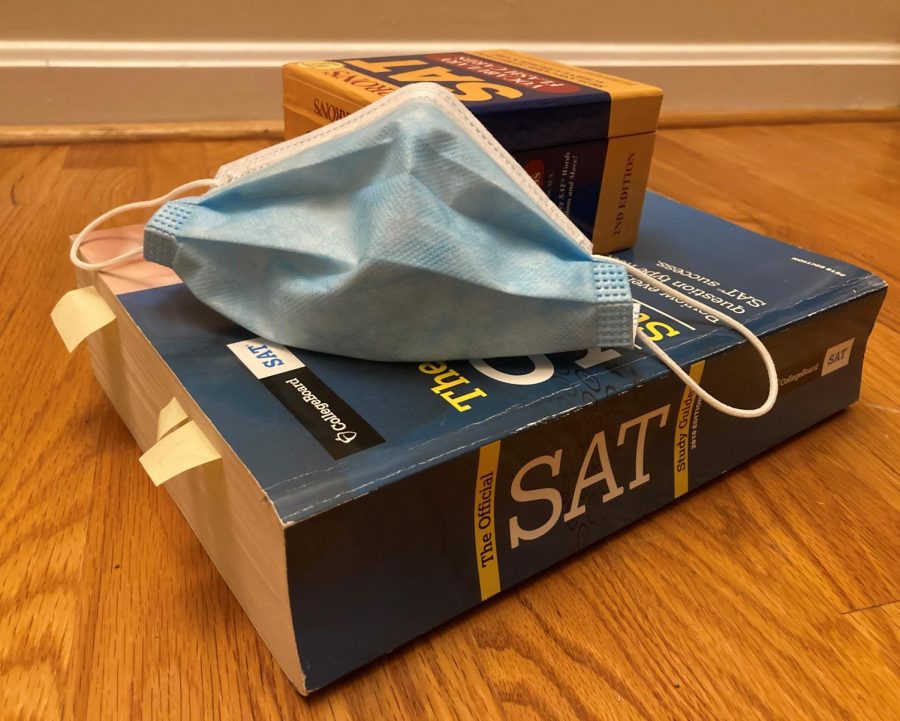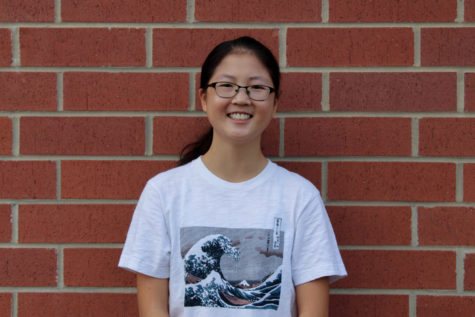The SAT undergoes crucial changes in response to the pandemic
One of the major changes to the SAT is that students are now required to wear a mask for the duration of testing.
October 13, 2020
The SAT. These two words evoke a sense of dread in even the most studious of students. While the world remains an uncertain and unpredictable place under the COVID-19 pandemic, taking the SAT seems to have remained a constant among high school students across the country. That being said, the SATs have still undergone key changes in order to comply with current public health guidelines.
The biggest change to the SATs is that students are now required to wear a mask for the entire duration of testing. Students must also be seated at least 6 feet apart within their testing room. For MCPS, this means that the capacity of each testing center has been limited to just 250 students, with each testing room having no more than 10 students, according to Bethesda Beat.
Before entering their testing center, students are also asked to verbally confirm a series of statements about their health, including that they have not been in contact with anyone who has tested positive for COVID-19, that they agree to wear a mask at all times and that they accept the risk of being exposed to COVID-19 while testing. Students who refuse to confirm these statements or comply with any other requirements will be dismissed from the testing center and their test scores will be cancelled without a refund.
With mandatory masks, socially-distant seating and hand sanitizer being made widely available in testing centers, the College Board has attempted to ensure that students are still able to take the SAT, something that has become a cornerstone of the college application process, in a relatively safe environment. “I think that [these new requirements] are necessary in that they helped me feel safer to go and take the test because I have people that are at risk living in my own home,” junior Emily Wu, who took the SAT in September, said.
Although some students may view these new policies as an additional inconvenience when taking an already-stressful test, others have been unfazed. “I think [the new policies] are a very small, small burden. It didn’t affect my testing at all,“ Wu said.
The next test dates for the SAT held at MCPS testing centers are Nov. 7 and Dec. 5. The College Board has waived the $30 test date change or test center change fee for these two upcoming administrations.
While students all over the country are still scrambling to sign up for an open seat to take the SAT, hundreds of colleges and universities have already announced that they are going test-optional for the class of 2021, including the University of Maryland and the Ivy League. Some colleges have even announced test-blind policies, meaning that they will not look at SAT or ACT scores even if students submit them. These colleges include the California Institute of Technology (Caltech), the University of California at Berkeley, Washington State University and Reed College, among a number of others.
Although the SAT has been billed as optional for so many colleges, the question arises of how much weight the test will carry in this year’s college admissions process and whether submitting test scores will give students an edge over their peers. With some students choosing to submit their scores and other students being unable to secure a seat to take the test in the first place, universities with test-optional policies will have to avoid any bias against students who do not submit scores. “We want students to control how they are reviewed,” Andrew Palumbo, the dean of admissions and financial aid at Worcester Polytechnic Institute said in an interview with The Atlantic.
The COVID-19 pandemic has only intensified the longstanding debate over whether colleges should take the SAT into account in the admissions process. Supporters of the SAT say that the test provides a check against grade inflation and can identify high-achieving students from low-income or minority backgrounds. On the other hand, critics say that the test unfairly favors students with higher family incomes and that other criteria, such as GPA, are better predictors of student success. Even prior to the COVID-19 pandemic, many colleges had already announced test-optional policies going forward. Time will tell whether the test-optional and test-blind policies instituted for this school year will last beyond the class of 2021.



